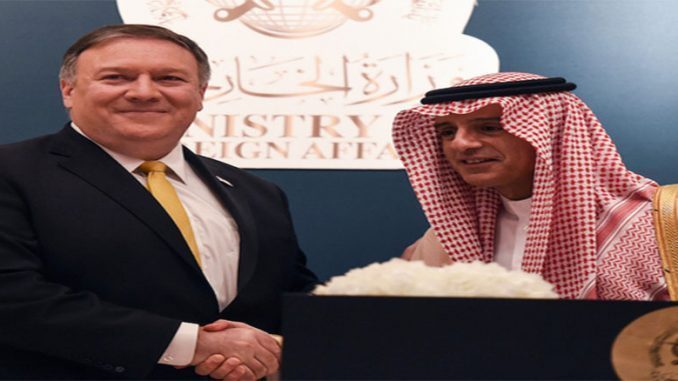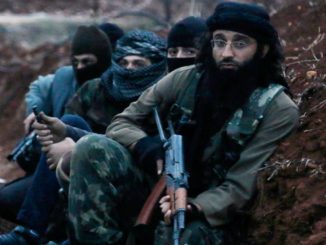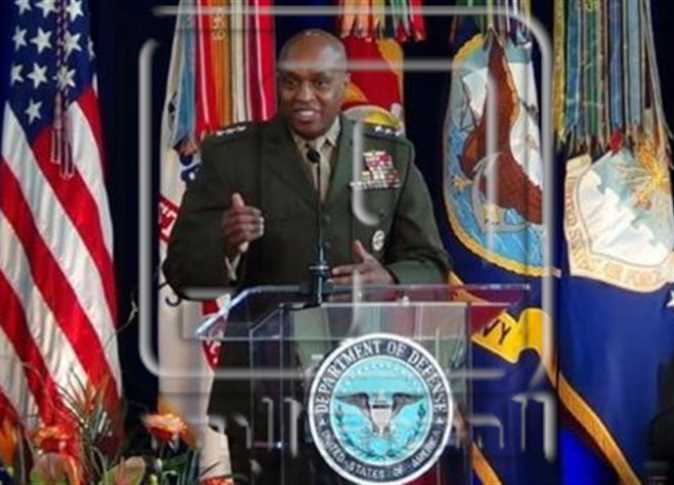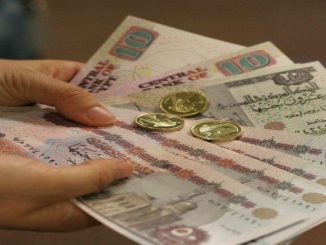
The new US secretary of state said that there was ‘overlap’ between Saudi Arabia and the US on how to deal with the Gulf crisis
Washington’s new chief diplomat lashed out at Iran on Sunday as he met Saudi leaders, before later landing in Israel to rally opposition to Tehran and brief US allies on President Donald Trump’s threat to quit the Iran nuclear deal.
Secretary of State Mike Pompeo, who set off on his first diplomatic trip within hours of being sworn in, met on Sunday with Saudi King Salman in Riyadh after dinner on Saturday with Crown Prince Mohammed bin Salman.
Pompeo flew on to Tel Aviv to meet Israeli Prime Minister Benjamin Netanyahu then headed to neighbouring Jordan, wrapping up a weekend of talks with some of Iran’s most fervent foes in the region.
After the meetings in Riyadh, he accused Iran of destabilising the Middle East, including through its support for Syria’s President Bashar al-Assad and for Shia rebels in Yemen.
“[Iran] supports proxy militias and terrorist groups. It is an arms dealer to the Houthi rebels in Yemen, and Iran conducts cyber-hacking campaigns. And it supports the murderous Assad regime,” Pompeo said at a joint press conference with Saudi Foreign Minister Adel al-Jubeir.
“Unlike the prior administration we will not neglect the vast scope of Iran’s terrorism.”
Trump is due to decide on 12 May whether to reimpose sanctions on Tehran, putting in peril a landmark 2015 nuclear accord which most world powers see as key to preventing Tehran from gaining atomic weapons.
‘Iranian interference’
But Trump and America’s Middle East allies argue that the deal, approved by Trump’s predecessor Barack Obama, was too weak and needs to be replaced with a more permanent arrangement and supplemented by controls on Iran’s missile programme.
Jubeir said Riyadh supports “efforts aimed at improving the nuclear deal” and called for further sanctions against Iran for its “violations of international decisions on ballistic missiles, its support for terrorism and its interference in the affairs of countries in the region”.
Iran has been accused of supplying missiles to the Houthis in Yemen, who on Saturday carried out the latest in a series of cross-border missile attacks on Saudi Arabia. Riyadh started a military intervention against the rebels in 2015 after they took control of large parts of the neighbouring country.
Netanyahu said he would also discuss Iran with Pompeo, noting that it was “important” that Israel was one of his first stops as the new secretary of state.
“I will discuss with him developments in the region, Iran’s growing aggression and – of course – the nuclear agreement with Iran, about which there will be a decision soon,” Netanyahu said at the start of a cabinet meeting.
Pompeo said in Riyadh that the nuclear deal “in its current form” does not do enough to make sure Iran never possesses atomic weapons, and again suggested Trump was ready to kill the agreement.
“We will continue to work with our European allies to fix that deal, but if a deal cannot be reached, the president has said he will leave that deal,” he said.
President Emmanuel Macron of France and Chancellor Angela Merkel of Germany left Washington this week after talks with Trump which failed to secure any promise to keep the deal alive.
In Washington, National Security Advisor John Bolton also said Trump was still considering his options on the nuclear deal.
“He has made no decision on the nuclear deal, whether to stay in or get out,” Bolton told Fox News Sunday.
‘Hopeful’ on Qatar crisis
Speaking to reporters on the flight to Tel Aviv, Pompeo said Washington and Riyadh were on the same page.
“I think we shared a great deal of overlap in terms of how we think about keeping stability in the Middle East,” he said.
Pompeo said he discussed calls from Trump for Saudi Arabia and other Middle East allies to contribute more to regional stability, including in Syria, where the US has more than 2,000 troops.
“We had good conversations about that, it’s a complicated problem in Syria,” he said, adding that he was “confident” of Saudi help but that it was too soon to discuss details.
He also said he was “hopeful” of an end to the Gulf crisis that has seen Saudi Arabia and regional allies impose a diplomatic and trade embargo on fellow US ally Qatar.
“They’re going to figure this out … We’ve got a common challenge in Iran, and I think they all recognise that.”
Pompeo will conclude his first diplomatic trip on Monday after talks with senior Jordanian officials, then fly back to Washington to move into his office in the State Department.



